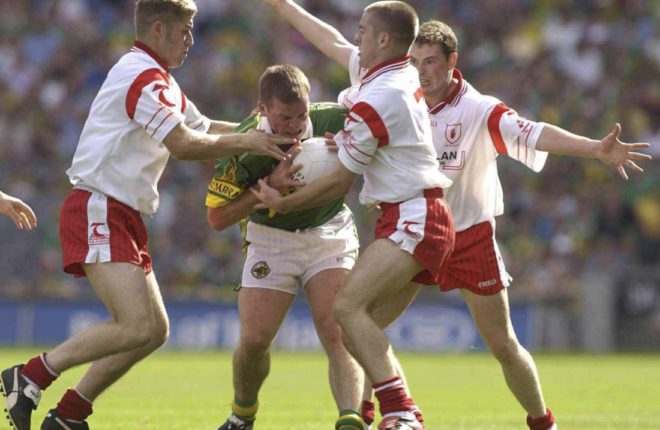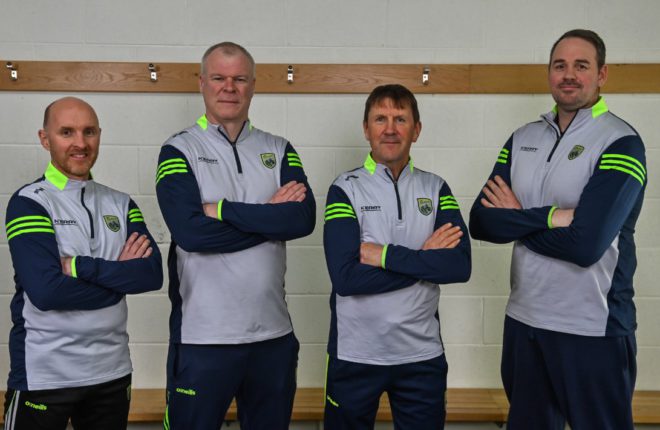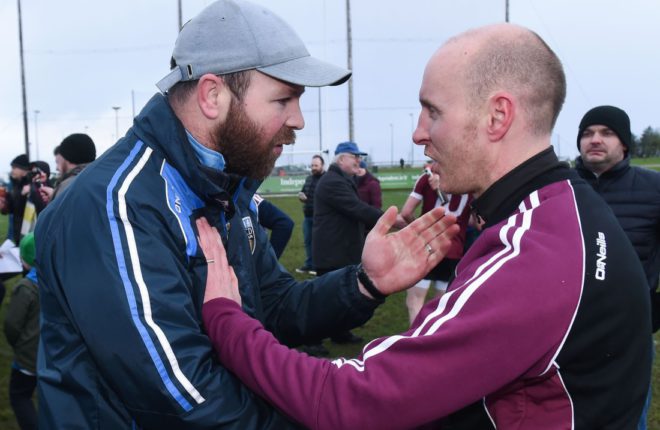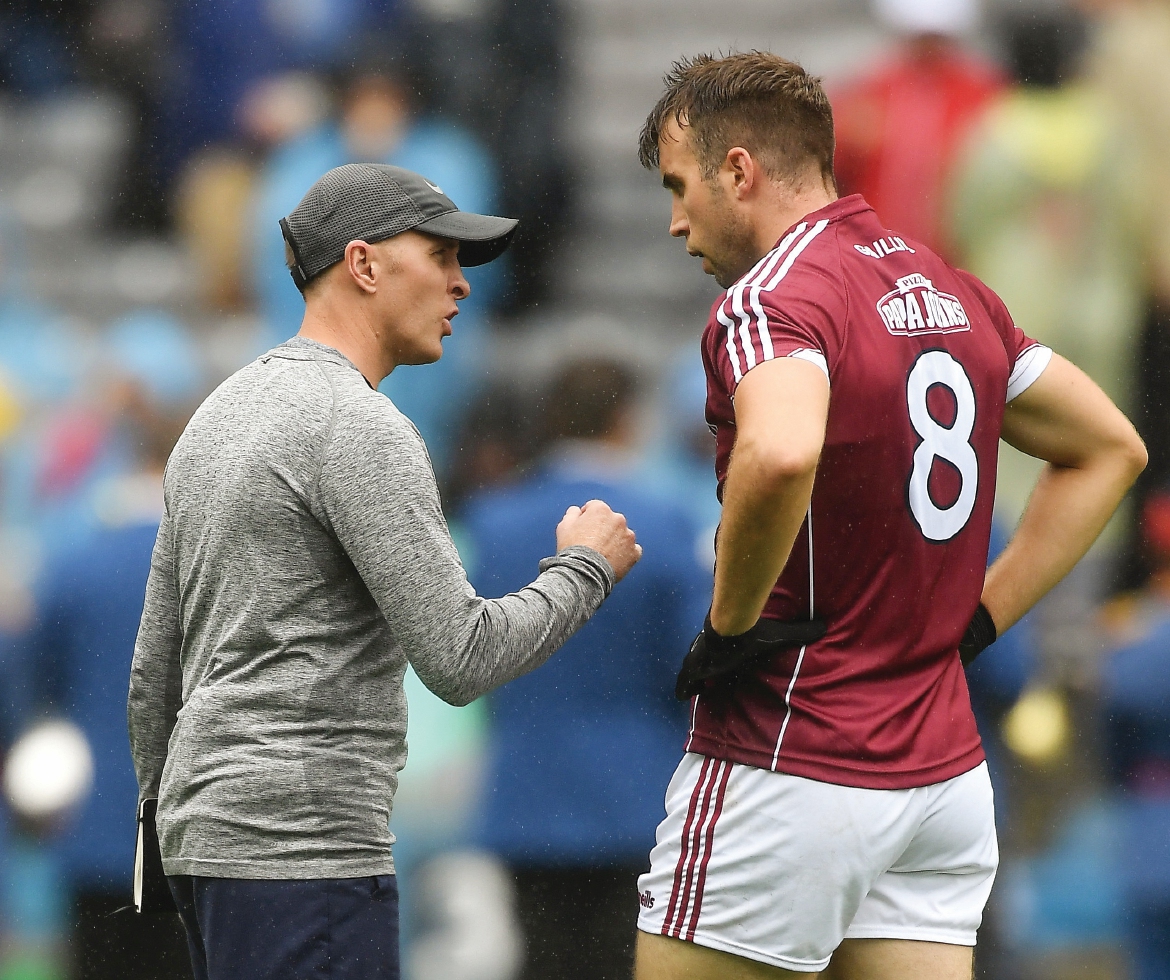Paddy Tally heads back to All-Ireland final this weekend. Michael McMullan looks at what he has brought to Kerry’s challenge.
ONLY Darren McCurry and Cormac Costello have managed to score a goal from play against Kerry this year.
The fact both moments could be argued as contenders for goal of the year speaks volumes for the Kingdom’s latest Jack O’Connor version, one with Paddy Tally’s coaching brain at its epicentre.
Kerry’s blueprint revolves around centre-back Tadhg Morley sitting deeper than a dedicated sweeper.
The Templenoe man was the player closing down both McCurry and Costello as they hit the net. He was back to cover the danger as Monaghan poured forward in search of a consolation goal in Inniskeen and was wrongly adjudged to have touched the ball on the ground leading to Conor McManus’ goal from a penalty, the only other goal Kerry have conceded in 2022.
Former Kerry defender and manager Éamonn Fitzmaurice saw the miserly defensive signs as early as January’s 2-23 to 0-6 home win over Limerick in the McGrath Cup.
“Straightaway, you could see there was a strong defensive shape,” recalled Fitzmaurice of Kerry’s first game of the season, noting how their defenders moved as play developed down one wing.
“The players on the other side, they are cheating into the middle to help out and leaving their man out wide. If their men become a threat they push out.”
It was simple, yet massive.
The Morley role as a sitter is one favoured by Jack O’Connor, who had Fitzmaurice, Seamus Moynihan and Eoin Brosnan sitting in the defensive armchair berth in the past.
For Fitzmaurice, he has noticed another standout improvement during the season.
“Whether it’s confidence or experience, or the Paddy Tally factor, but the backs and their one on one defensive skills, they seem to have all really improved.”
The Kerry players have developed physically, with Armagh native Jason McGahan as their Head of Athletic Performance, and their footballing ability has followed in tandem with the stars of their golden minor generation.
“Obviously Paddy Tally is having an influence there too, I think all of the backs have improved their defensive game,” Fitzmaurice reiterated.

UP CLOSE…Kevin Hughes, Philip Jordan, and Gavin Devlin close in on Dara Ó Cinnéide in Tyrone’s 2003 win over Kerry
He draws a contrast with Kerry getting turned over in last year by Tyrone in the All-Ireland semi-final after hitting the Red Hands for six goals in their Killarney league mauling.
“The first goal Conor McKenna scored against Kerry last year (in the semi-final) came when they were wide open and it was walked into the net,” Fitzmaurice added.
“The pattern of this year is conceding so few. It has been hugely successful…if you look over the last 20 years, Kerry would’ve always scored goals but there’d be goals at the other end.”
Fitzmaurice wasn’t surprised to see Tally drafted in by Jack O’Connor, highlighting how Kerry were “fairly pragmatic” about change. If the knowledge isn’t inside the county they’ll go searching, like his own addition of current Galway selector Cian O’Neill from Kildare to help with the Sports Science side of their 2014 winning team.
Waterford man Pat Flanagan’s running expertise tuned an IT Tralee team that dominated the Sigerson Cup in the 1990s and was taken on board with O’Connor in Kerry.
The same can be said for Paddy Tally who was mooted to be joining Jack O’Connor in Kildare before the current Kerry gig was the dangling carrot.
“To get someone like that to come in and operate in a management setup, to bring his expertise in and to tighten Kerry up at the back, it was great,” Fitzmaurice said.
On the attacking dimension, the former Kerry boss isn’t au fait with the nuts and bolts of Tally’s input, but acknowledges how much his coaching is lauded.
“The way Jack works, he takes feedback and opinion from everyone and is happy to delegate to the experts around him,” Fitzmaurice explained, with the buck stopping at O’Connor’s door on the makeup of Kerry’s steps into battle.
A man who knows Tally well is GAA encyclopedia and journalist Kevin Kelly, a fellow half-forward in the Galbally attack as Tally arrived on the scene.
From the Team Talk Mag stable, Kelly has his finger on the pulse and is a regular attender of Tyrone games.
He was in Killarney for Kerry’s hammering last season and the return fixture earlier this year that saw Tyrone escape relegation.
Kelly echoed Fitzmaurice’s take on Kerry’s defending. It is “more structured” with a team element rolled in. No longer is the number six picking up the centre forward, in that old-school type man-on-man approach.
“They played some good attacking football,” Kelly said of Kerry’s performance this year. “Now, they can get bodies across (in defence) and their judgement seems to be right. They don’t leave their man for the sake of leaving.”
The “right option” is taken, something honed on the training field, but there is more to Tally who Kelly insisted isn’t a one trick pony, referring to his ability to coach St Mary’s, Belfast teams to peg back significant deficits on their way to landing the Sigerson Cup.
He also pointed to the Tyrone forward line when Tally was in charge. Reciting names such Canavan, O’Neill, McGuigan, Cavlan and Mulligan, you get the flavour of one of the greatest attacking units of all time.
”It is the full package,” Kelly said of Tally’s Kerry brief. “It is not about teaching them how to defend. I don’t know if Kerry would want to be recognised for getting somebody to come down and show them how to play the game.”
Jack O’Connor won’t have Tally trekking all the way to Kerry and not to get the most out of him.
“If Paddy has seen something at training, with him being a forward himself, I am sure he would express his opinion,” Kelly added of his Galbally clubmate.
“Paddy coached one of the best forward lines ever and if you have a man in the backroom team that has coached them boys, there will be ideas in the white heat of battle. It’s a matter of millimetres and the difference of getting over the line.”
When Galbally won the Division Two League in 1991, Paddy Tally was just coming onto the scene with a few games on a team captained at midfield by Pat McKeown who had played in Tyrone’s 1986 run to the All-Ireland final.
Colin Hetherington was his midfield partner and Tally was soon a regular and went to play the rest of his senior career.
“He became one of the more experienced players and he became a leader on the team,” Kelly outlined. “He was very nimble and fleet footed, he had a good right foot on him and a good eye for a score.”
Kelly and Tally shared the free-taking duties, with the latter a pivotal part of the team that reached the 1997 senior final, losing to Errigal Ciaran.
Having played on the same Ulster u-14 winning team in St Ciaran’s, Ballygawley as Peter Canavan, he was on the 1995 Red Hand squad that lost to Dublin in the All-Ireland final.
Bar taking the odd session around the club, it wasn’t until he went to St Mary’s, Belfast that the Jim McKeever influence steered him fully down the coaching path.
“It wasn’t really jumping out at you,” Kelly said of any instinct that Tally would go in that direction.
“It’s not like now, a manager was always an older person and that’s what it was back then. He got involved in coaching in St Mary’s and it was always inevitable that he’d push on.”
Tally managed the club senior team in 2006 and alongside Kelly and Larry Murphy, they brought u-21 success back to the club.
It was his role as coach under Mickey Harte with Tyrone seniors where he made his mark.
Part of that squad was goalkeeper Pascal McConnell who wasn’t surprised to see Tally, who he rates as one of the top coaches in the game, arrive to fuel Kerry’s title charge.
“Paddy was unreal,” McConnell said. “He came with no proven credentials when Mickey took him on board.
“He was young and his enthusiasm, desire, his will to win and make players better in conjunction with Mickey really stood out.”
It didn’t take long before the players realised Tally was “the real deal” with a scientific approach they’d never come across.
Mental preparation became a constant, also giving the Tyrone players an idea of what recovery should look like. No longer was it a case of a few pints and back to training on the Tuesday night.
“It wasn’t just recovering the day after and you were ready to go again. It was looking after yourself after a high intensity game or training session,” McConnell added, also referring to how Tally helped with their in-game management.
Yes, there was a focus for the “70 or 75” minutes, but Tally broke the jigsaw down into “30-second intervals” of “high intensity play” when the ball arrived in a player’s zone.
“It was about seeing it through, to win possession and to use it wisely for the next passage of play,” McConnell said.
“He opened up a whole new world of training between mental approach, recovery, preparation. This was something they hadn’t seen the like of, a real insight on how to conduct yourself as a senior inter-county footballer.”
There were different buzz words and “hunt” had a special meaning that exploded into life in that team-defining All-Ireland semi-final win over Kerry in Tyrone’s breakout year of 2003.
“It was hunt the ball…in packs as a group,” McConnell said, with the conviction of his voice elevating on every passing word.
“When you are predators for the ball, you went in packs. Once that call was made, it triggered everyone to “here goes” and it was time to go for it.”
In a cauldron like Croke Park, the call might not have been heard at the other end of the field. But, in the vicinity, it ensured Tyrone players went like “f**king terriers” to get their hands on the ball and avert any danger.
“That absolute milling match (2003 against Kerry) at the foot of the Hogan Stand, that was Paddy Tally, in conjunction with Mickey’s intensity as well,” said McConnell of the duo’s collective input to how players should conduct themselves.
Training at match intensity for 70 minutes opened up a new world to a group that would add three senior titles to their underage promise.
Éamonn Fitzmaurice was on the Kerry team that day and still carries a regret of that moment which laid the foundations on Tyrone’s upper hand over the Kingdom.
When Dara Ó Cinnéide found himself surrounded by Philip Jordan, Gavin Devlin and Kevin Hughes – all with their hands out wide – Kerry were in trouble. Owen Mulligan was close by too.
It was only the beginning of unleashing hell. Darraga Ó Sé was swarmed up in similar fashion seconds later. This was “hunt” in its purest form.
Fitzmaurice was stationed just outside the collective cluster with eyes on the unmarked Liam Hassett. If only Kerry eyes could see enough daylight to pop the ball out.
“I had made up my mind that I’d kick a 30 or 40-yard pass to Liam,” Fitzmaurice recalls with total clarity.
But the pinball continued in the wrestle for supremacy and he eventually mucked in too, in search of an inch Kerry would never find.
“I always maintain that if we were a bit smarter, that incident shouldn’t have happened at all,” Fitzmaurice said of playing into Tyrone’s hands, a group he hailed as “brilliant” footballers.
“If we managed to get away with it and Liam Hassett got a point or set up a goal – because they were very open with the way they had committed – it could’ve been a different game and a different conversation.
“It worked well for them and gave them huge life. They brought an intensity we had never experienced.”
It resembles some of the fingerprints Kevin Kelly can see on the current Kerry team who had conceded an average of 11 points across their 15 games in all competitions in 2022. As well as the defensive strategy focussed on positioning, there is hunger.
“You can see that in their play,” Kelly said. “Once they get an opponent wrapped in the forward line, there is another one or two men tackling him and that has to come from Paddy.
“That’s part of his coaching ethos, Kerry never did that before but they are adapting well to it.”

A KEY TO THE KINGDOM…Paddy Tally (left) with Diarmuid Murphy, Jack O’Connor and Micheál Quirke
McConnell can see links between Kerry this season and Tyrone’s 2003 NFL campaign that saw them keep seven clean sheets.
“The key ingredient, when you look at the Kerry team last year against Tyrone, they faltered. Tyrone looked them straight in the eye and Kerry blinked first,” he said of the All-Ireland semi-final.
Kerry’s acid test this year, after their Munster waltz and a toothless Mayo was a clash with their age old rivals Dublin.
“It was a full house,” McConnell states, referring to how Ciaran Kilkenny led the blue charge back into the game.
“When Dublin are on a roll like that and they’re level with 60,000 Dublin supporters shaking Croke Park, it’s a daunting experience. You can’t help but notice the noise…it is immense.
“Fair play to Kerry, they withstood the storm and Sean O’Shea then stepped up. That epitomised the mental steeliness this Kerry team has finally obtained when he struck that last point. Credit where credit is due, they showed the steely resolve you need to win All-Irelands.
“Kerry stood face to face with them and went a little bit further than they did against Tyrone last year.
“They showed that bit of mental steeliness and Tally has to take huge credit for that and Jack O’Connor is a winner himself,” McConnell added.
“I thought there was an air of complacency with Kerry last year as well and Paddy doesn’t let complacency set in in any way, shape or form.
“That shone through when he took our team for those two years in the noughties, zero complacency.”
Looking on at Kerry’s journey to the season’s greatest day, Mark Doran feels regret at how Down allowed Paddy Tally to slip from their grasp.
A member of Down’s 2010 squad Tally trained to the All-Ireland final under James McCartan’s management, Doran was part of Tally’s management team when he was Down boss.
After a three-year term that included promotion to Division Two, Tally didn’t get the backing for a fourth year.
“I am not surprised Kerry came and got him,” Doran said. “Looking back to when I was there in 2010, he is the best coach I have ever come across.
“Result speak for themselves, when Paddy came into Down (as manager in 2019) they were in Division Three; he took them up and kept them there. Now, the minute he went away, we are back down again.”
Like Kevin Kelly, Doran swaps Tally’s tag of a “defensive coach” and stresses he has more to offer.
“It is not all about defensive work, people get carried away. They (Kerry) are set up well at the back.
“Tadhg Morley is their plus one, it’s not like they are bringing five or six men back to sit at the edge of the ‘D’,” adds Doran.
“It’s how snappy they are in the tackle and the turnovers,” he said of watching the Kingdom stand tall against the Dubs.
“If you carry a ball into contact against Kerry, nine times out of ten you are losing it,” he added, hailing their mix of a kicking game into attack and breaking at pace in support.
“It was the intensity and attention to detail he brought to training, it is all geared towards matches and I can’t speak highly enough of him.
“It’s the third county team he has coached to a final. It is a massive boost to the likes of Kerry, he has made a big difference with their tackle and they are playing on the edge.
“Anybody that has been coached by Paddy Tally, if you speak with them, they are telling you he is a great coach.”
Kevin Kelly feels it’s Tally’s range of experience that makes him a useful addition to Jack O’Connor’s plans.
On top of his Sigerson experience, being involved under Brian McIver, James McCartan, and Mickey Harte has rounded him, with his time in Galway under Kevin Walsh allowing him to learn away from Ulster’s minefield.
“Talking to him, he knows the whole coaching aspect inside and out,” Kelly said, stressing how Tally has constantly evolved and up skilled himself.
“His record speaks for itself; he is one of the top trainers about. The fact he went to Galway, he’d have been broadening his horizons.”
During his time in Galway, he coached Paul Conroy, Sean Kelly, Johnny Heaney, Damien Comer and Shane Walsh on their 2018 Connacht winning side and their win over Kerry in the Super Eights later in the season.
“It was probably too big an opportunity to turn and he has coached at the highest level,” Kelly said , surmising Tally’s decision to throw his lot in with Kerry.
“Your own county will always be number one and that 2003 (All-Ireland), there will only always be one first.
“After that, he would’ve wanted to test himself outside the province and Galway was as good a place as any with the brand of football very easy on the eye.
“When the Kerry call came, I’m sure he wanted to coach at the highest level. Kerry will learn from him, but he’ll learn from Kerry.”
Another string to Tally’s bow is how he has championed the siege mentality. Most successful teams have a cause tucked away somewhere, ready to call on when a squad needs an extra rev at a season’s crossroads.
It’s a trait taken from St Mary’s, Belfast who made their name by rubbing shoulders with the big noises, littered with county stars, in the Sigerson Cup.
Ruairi Mooney made his name as a sticky defender in their 2017 winning team, who came from two goals down to defeat UCC and UCD on their way to glory.
Mooney spoke of a “totally new level” of training and how intense the sessions were.
“They were very structured and he had his coaching down to a tee. You always came away from those St Mary’s training sessions feeling like you really had to be switched on. You put a lot in and you got a lot out of it,” Mooney pointed out.

WE MEET AGAIN…Paddy Tally and Galway selector John Divilly after St Mary’s Sigerson Cup final win over Divilly’s UCD team in 2017
Physical intensity was matched by high levels of communication. A ‘Ranch’ man to the core, Tally fed into the outside perception of their teams always being greater than the sum of their parts. Their gritty and dogged nature didn’t happen by chance.
“He (Tally) would’ve been repeating the message throughout the training sessions and meetings,” Mooney said of an identity that was hard to describe to those on the outside.
“People talk about Alex Ferguson and his siege mentality and being the underdog. It was all about the group and how they stuck together,” Mooney said.
“In St Mary’s, we were expecting to be up against it, to see out a gritty game and grind out results.”
They had talent, but much of the rest was how Tally developed everyone else and had them rowing the same boat into the rapids upstream.
“Paddy knew his stuff and although we were a small college, no stone was left unturned,” Mooney added. Key players in the opposition were identified without being overly concentrated on.
Mooney was handed a marking brief and that was it, before they identified how to maximise their own hand.
“Paddy didn’t go out of his way to make a fuss of opposition players. He knew our group would be fit to handle whatever the other teams had,” Mooney said of Tally’s delegation.
In a conversation with Conor Meyler, the 2017 winning captain, they reflected how Tally would “squeeze the juice” out of every team coming through the college.
“He managed to get the potential out of them, so we wondered what was he could do with the best panel in Ireland coming into training,” Mooney said.
“I don’t know what is going on inside that Kerry changing room, but I’d say there is a certain amount of that siege mentality of it being us against the world with Tally, whether you are the favourite or the underdog. That closely knit group approach, Tally relishes that and no matter what team it is galvanises it.”
As a lecturer and coach, Tally has the experience of sussing out individuals and filing them away in the “arm around” or “kick up the backside” style of management.
“He will be good at figuring out the layout in the Kerry dressing room and knowing what messages they need to be told.”
The messages will be again be defined this weekend, with taking Sam to Kerry as the overall big picture.
If Tally can help Kerry keep a 13th clean sheet of the season and Paudie Clifford can feed his brother David and Sean O’Shea with enough ball, Galbally will have an All-Ireland winner in their midst once again.
Receive quality journalism wherever you are, on any device. Keep up to date from the comfort of your own home with a digital subscription.
Any time | Any place | Anywhere












